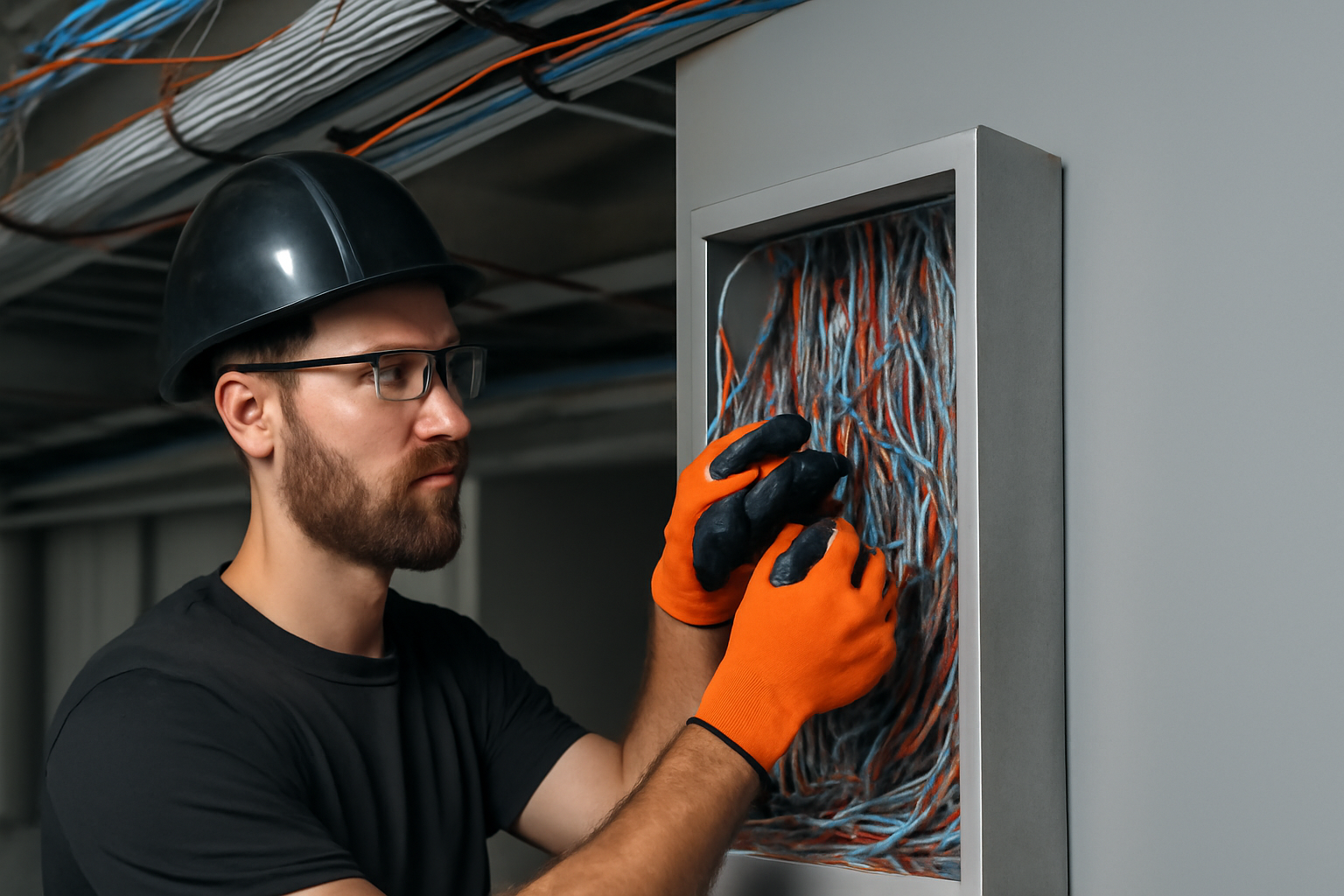The Role of Low Voltage Contractors in Commercial Construction
In modern commercial construction, low voltage wiring contractors are integral players in ensuring that buildings are equipped with the advanced...

In modern commercial construction, low voltage wiring contractors are integral players in ensuring that buildings are equipped with the advanced technology systems that businesses rely on daily. From security systems and data networks to fire alarms and building automation, low voltage contractors install, manage, and maintain systems that support the functionality and safety of modern buildings.
While traditional electrical contractors handle high-voltage systems that power lights and outlets, low voltage wiring contractors focus on the low-voltage infrastructure that powers communication systems, surveillance, HVAC controls, and more. This blog explores the essential role these contractors play in commercial construction projects and the key benefits they bring to the table.
What Does a Low Voltage Wiring Contractor Do?
Low voltage wiring contractors specialize in installing and managing systems that require lower power inputs than typical electrical systems. These systems often operate on voltages ranging from 24V to 120V, and they include:
- Data cabling systems (e.g., Ethernet, fiber optics)
- Security and surveillance systems (e.g., CCTV cameras, access control)
- Fire alarm and life safety systems
- Building automation systems (e.g., lighting control, HVAC systems)
- Audio-visual systems (e.g., conference room technologies)
In commercial construction, these contractors are responsible for installing, connecting, and maintaining these crucial systems that ensure buildings operate efficiently, securely, and safely.
Why Low Voltage Contractors Are Critical to Commercial Construction
Low voltage wiring contractors are more than just installers—they are experts in creating the network of systems that modern commercial buildings depend on. Here’s why their role is so critical:
1. Enabling Modern Building Functions
In today’s commercial buildings, everything from security to heating and cooling relies on low voltage systems. Low voltage wiring contractors ensure that these systems are properly installed and integrated, enabling seamless communication between devices and creating a smart, efficient environment.
For example, building automation systems powered by low voltage wiring contractors connect HVAC, lighting, and other systems to improve energy efficiency, reduce operational costs, and create a more comfortable environment for employees and customers.
2. Ensuring Building Safety
In commercial spaces, safety is paramount. Low voltage contractors install and maintain fire alarm systems, surveillance cameras, and access control systems, all of which are crucial for keeping the building and its occupants safe.
- Fire alarms and life safety systems: These systems are critical for early detection in case of emergencies and are required by law in most commercial buildings.
- Surveillance systems: CCTV cameras and security systems, powered by low voltage wiring, help protect buildings from theft and unauthorized access.
- Access control systems: Low voltage contractors design and install secure entry points, ensuring that only authorized personnel can access restricted areas.
By ensuring the proper functioning of these systems, low voltage contractors help minimize safety risks and comply with building codes and regulations.
3. Supporting Data and Communication Networks
In the age of digital transformation, a strong communication network is vital for any business. Low voltage contractors install data cabling systems (e.g., Ethernet cables, fiber optics) that connect computers, servers, and other devices, enabling reliable communication and high-speed internet access throughout the building.
Whether it’s providing internet access in offices or connecting security cameras to a monitoring system, low voltage wiring is essential for supporting the technology infrastructure that businesses depend on daily.
4. Future-Proofing the Building
Commercial construction is an investment that spans decades, and low voltage contractors play a key role in ensuring that buildings remain adaptable to new technologies. By using scalable and flexible wiring systems, these contractors enable building owners to easily upgrade or reconfigure systems as new technologies emerge.
For instance, installing fiber optic cables instead of copper wiring future-proofs the building’s communication systems, allowing for faster data transfer speeds as technological needs increase over time.
The Challenges Faced by Low Voltage Wiring Contractors
While low voltage wiring contractors are essential to commercial construction, they also face a unique set of challenges:
1. Coordination with Other Trades
Low voltage systems are often integrated with high voltage systems, and contractors must coordinate with general electrical contractors, HVAC specialists, and other trades to ensure the seamless installation and integration of systems. Miscommunications or lack of coordination can lead to delays or conflicts on the job site.
2. Compliance with Local Codes and Standards
Low voltage wiring must comply with local building codes, safety regulations, and industry standards. Contractors need to stay updated on evolving regulations and ensure that all systems are installed according to these guidelines.
3. Complexity of Modern Systems
Modern buildings often include a complex array of low voltage systems, from network cabling to building automation. Designing and installing these systems requires specialized knowledge and technical skills. Contractors must ensure that the systems are correctly integrated and that troubleshooting can be done easily when issues arise.
How to Select the Right Low Voltage Wiring Contractor
Choosing the right low voltage wiring contractor is essential for the success of any commercial construction project. Here’s what to look for:
- Experience and Expertise: Look for contractors with experience in commercial projects similar to yours. They should be familiar with local building codes, regulations, and industry standards.
- Comprehensive Services: Choose contractors that offer a full range of low voltage services, including design, installation, and maintenance. This ensures consistency and reliability throughout the project.
- References and Reputation: Always check references and look for contractors with a proven track record of delivering quality work on time and within budget.
- Technical Support: A good low voltage contractor will provide ongoing technical support and troubleshooting services, ensuring your systems continue to operate efficiently after installation.
Conclusion
Low voltage wiring contractors are indispensable to the success of any commercial construction project. Their expertise in installing and maintaining critical systems—such as data cabling, security systems, and building automation ensures that buildings are safe, efficient, and future-ready.
By leveraging their technical skills, businesses can not only comply with regulations but also enhance building functionality, improve energy efficiency, and create safer environments. As the construction industry continues to embrace digital transformation, the role of low voltage wiring contractors will only become more essential in shaping the smart buildings of the future.





